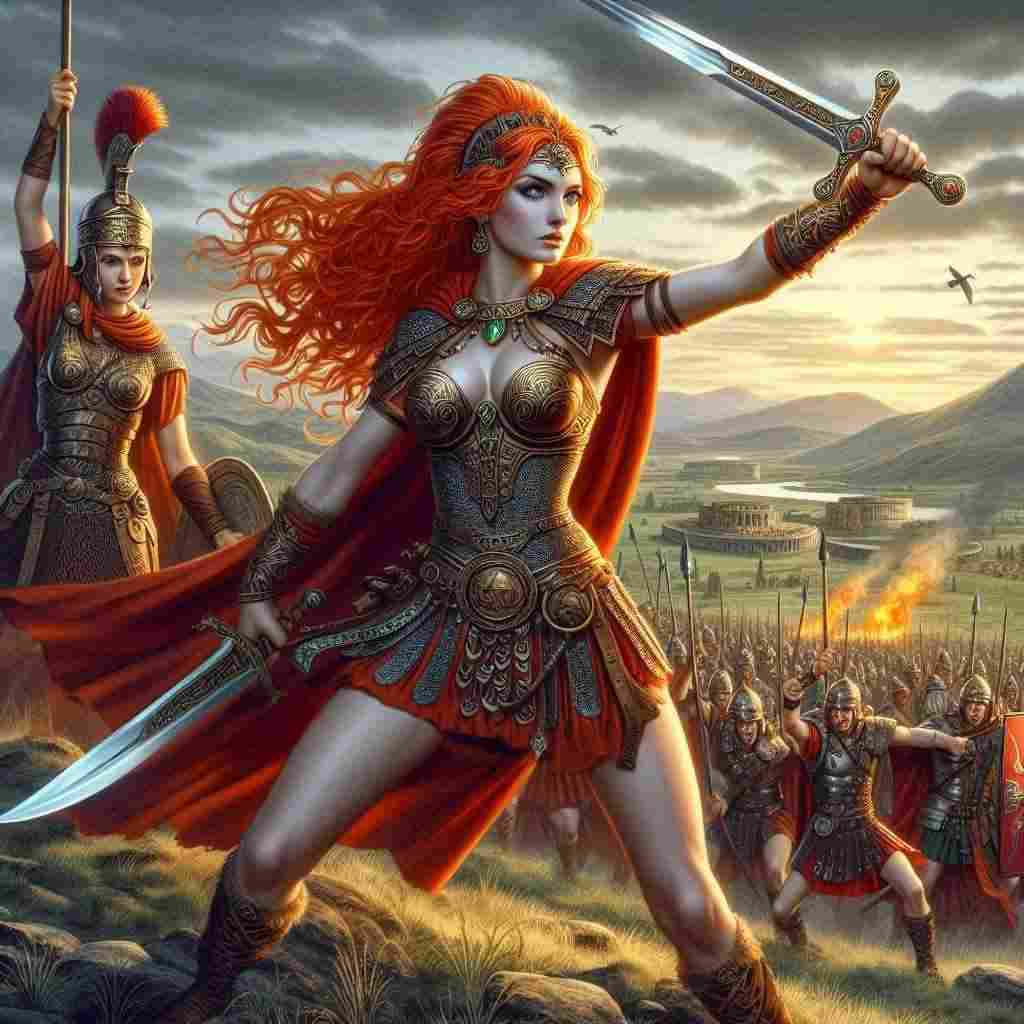Boudicca: Warrior Queen
Richard

From misty shores where ravens call, a legend's flame begins to sprawl
A queen of fire, a warrior's heart, Boudicca stands, her anger's art
They plundered wealth, they took her pride, her husband's death, she couldn't hide
The Romans came with greed and might, but freedom burns a fierce, bright light
Her daughters raised their blades on high, Britannia's wrath will fill the sky!
Camulodunum fell in flame, Verulamium shared the same
Londinium choked in smoke and ash, Boudicca's fury, a deadly crash!
Her golden hair, a battle rage, her voice commands a turning page
The Iceni rise, a vengeful tide, for fallen kin, they'll take no side
With chariots thundering, warriors bold, they crushed the Ninth, a story told
Though victories stacked, a final stand, Suetonius' legion met her hand
Outnumbered, trapped, a desperate fight, Boudicca's dream took flight at night
Poison's kiss, or battle's strain, her spirit lives, though victory's wane
Boudicca, Queen of Briton's lands, a warrior's legend, forever stands!
Richard's Boudicca: Warrior Queen
"Boudicca: Warrior Queen" is a powerful ballad that vividly brings to life the story of one of Britain's most iconic historical figures. The song skillfully weaves together historical events with emotive imagery, creating a stirring narrative that resonates with themes of rebellion, vengeance, and the indomitable human spirit.
The opening lines immediately transport the listener to ancient Britain, with the evocative image of "misty shores where ravens call." This sets a mystical, almost prophetic tone, hinting at the legendary status Boudicca would achieve. The description of Boudicca as a "queen of fire" with a "warrior's heart" establishes her as a formidable figure from the outset, foreshadowing the fierce resistance she would lead against Roman occupation.
The song doesn't shy away from the brutal reality of Boudicca's motivation. The lyrics speak of plundered wealth, stolen pride, and the death of her husband, painting a picture of personal and cultural devastation wrought by Roman imperialism. This provides a poignant backdrop for Boudicca's transformation from wronged queen to avenging warrior.
A recurring refrain in the song serves as both a battle cry and a thematic anchor: "The Romans came with greed and might, but freedom burns a fierce, bright light." This powerful juxtaposition encapsulates the core conflict of the Iceni rebellion – the struggle between imperial domination and the passionate desire for liberty. The imagery of fire, which appears throughout the song, reinforces this theme, symbolizing both destruction and the unquenchable spirit of resistance.
The song's structure mirrors the trajectory of Boudicca's campaign, building in intensity as it recounts her victories. The fall of Camulodunum, Verulamium, and Londinium are described in vivid, violent terms – "fell in flame," "choked in smoke and ash" – creating a sense of unstoppable momentum. The repeated refrain of "Boudicca's fury, a deadly crash!" emphasizes the shock and awe of her rebellion, which seemed to shake the very foundations of Roman rule in Britain.
However, the song doesn't present a simplistic tale of triumph. It acknowledges the ultimate defeat of Boudicca's forces, describing a "final stand" against Suetonius' legion. The phrase "Boudicca's dream took flight at night" is particularly poignant, suggesting both the end of her rebellion and the enduring nature of her legacy. The ambiguity surrounding her fate – "Poison's kiss, or battle's strain" – adds to her mystique, allowing her to transcend historical specifics and enter the realm of legend.
Throughout the song, Boudicca is portrayed not just as an individual, but as a symbol of her people's resistance. The imagery of her "golden hair" and commanding voice paints her as an almost mythical figure, while references to "fallen kin" and the rising of the Iceni remind us of the broader struggle she represents. The mention of her daughters raising their blades alongside her adds a familial dimension to the conflict, underscoring the deeply personal nature of the rebellion.
The final lines of the song cement Boudicca's place in history and cultural memory. Despite the failure of her rebellion, she is remembered as a "warrior's legend" who "forever stands." This speaks to the power of her story to inspire and captivate, long after the battles have ended.
"Boudicca: Warrior Queen" is more than just a recounting of historical events. It's a meditation on the nature of resistance, the cost of freedom, and the power of a single individual to challenge an empire. By bringing Boudicca's story to life in such vivid, emotive terms, the song invites listeners to contemplate these timeless themes and to find echoes of her struggle in their own lives and times.
This text was generated by AI and is for reference only. Learn more

